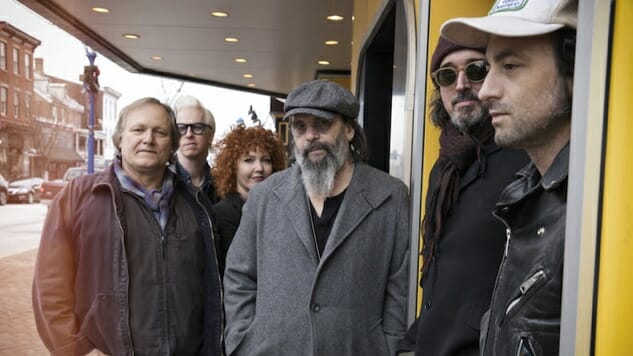Steve Earle: Desperado Remembering a Train
Photo By Tom Bejgrowicz
Steve Earle was singing Guy Clark’s songs before he ever met the man who would become his greatest mentor. Earle remembers playing “Desperados Waiting for a Train” at Houston’s Sand Mountain Coffee House as an 18-year-old in 1973. From the stage, he couldn’t help but stare at the facing wall with its big painted faces of Clark, Mickey Newbury and Townes Van Zandt, the Mount Rushmore of Texas songwriters born in the 1940s. Earle remembers he had a real good view of the mural because there were so few people in the audience.
“I’d already met Townes,” Earle remembers, “because I had crashed Jerry Jeff Walker’s birthday party, so I knew all about Guy and his songs. In fact, when I moved to Tennessee at 19, I was following Guy there. Guy and Kris had followed Mickey Newbury there, because Mickey had proven you could write good songs in Nashville and get paid for them.”
Earle released Townes, an album of Van Zandt’s songs in 2009, and he knew that he would eventually record and release an album called Guy. Today that album comes out, almost three years after Clark died on May 17, 2016.
“When he passed away, I knew instantly I’d have to make the Guy record,” Earle explains. “I didn’t want to run into that motherfucker onto the other side having made the Townes record and not having made the Guy record.”
Clark (who wrote “Heartbroke” and “L.A. Freeway”) and Van Zandt (who wrote “Pancho and Lefty” and “If I Needed You”) were not just two of the best songwriters of their generation; they were also best friends and with Guy’s wife Susanna Clark formed an inseparable trio that sometimes lived together and always sought each other out for a first opinion on a new song or a new painting. Earle counts the three of them as his greatest teachers.
“I threw out all the songs I’d written before when I moved to Tennessee,” Earle says of his arrival on Elliston Place in 1974, “because I realized they weren’t good enough. The songs were that much better in Nashville. There were two salons in town, one for songwriting and one for musicianship, that were connected by people who had long hair and listened to the Beatles and Stones as well as country. Guy and Susanna were at the center of the first and John Hartford was at the center of the other. I hung out at both of them and that’s how I learned my trade.”
You can see an example of the Clarks’ salon in action in the documentary movie Heartworn Highways. After enough food has been chewed and enough liquor has been swallowed, the guitars come out and people start singing their latest songs. If you don’t have your own guitar, someone will pass you theirs. As the camera pans around the living room, you can see the young faces of Earle, Rodney Crowell, John Hiatt, Steve Young and Richard Dobson, all surreptitiously looking to Guy and Susanna for a nod of approval.
“It was an education,” Earle told me in 1996. “That’s exactly what it was. They weren’t always the best influence in the world, but they instilled in me the idea that you do this no matter what. It isn’t about money. Townes is self-destructive, and that’s a separate deal, but before that set in, he was committed to doing this, and he’s one of the best songwriters who ever lived. Guy just has a real methodical, intentional focused integrity and always has. That makes an impression on an 18- or 19-year-old.”
“If you could get Guy to tip his hat and put his stamp on what you were doing,” Crowell told me in 2003, “you were on your way. Most of the time the feedback was not getting any at all. I remember the first time I got an acknowledgement from Guy. I played ‘Bluebird Wine’ at one party, and he said, ‘That’s alright, kid.’ That’s all, but I felt like I’d won a Grammy. Then I wrote ‘Til I Gain Control Again’ and Townes almost acknowledged it. That was my goal, to get Townes’ approval, and it took a while.”
“Rodney was just very talented,” Guy Clark told me in 2002; “he played and sang like a bird. Steve was very raw, very talented. His songs had a real interesting edge to them. I didn’t feel like I was taking them under my wing; I thought they were good; I thought I might learn something from them.”
-

-

-

-

-

-

-

-

-

-

-

-

-

-

-

-

-

-

-

-

-

-

-

-

-

-

-

-

-

-

-

-

-

-

-

-

-

-

-

-








































